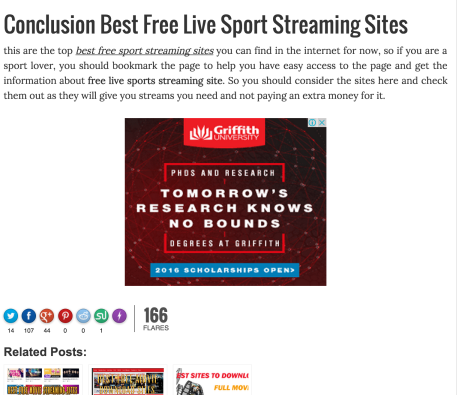Griffith University blames Google and media agency Ikon after ads appear on piracy sites
Griffith University has said Google and its agency Ikon Communications are at fault after its ads appeared on unlicensed content streaming sites.
In addition to the Australian university, Mumbrella Asia reports other brands appearing on the website included Singtel, Procter & Gamble, POSB Bank and Toyota.
It once again shines a light on programmatic buying and whether media agencies have adequate blacklists for clients.



I think it’s great alignment, majority of people on those streaming sites are probably within their target demo…
I do not believe the agency can be held accountable. It should be the network / dsp.
Thanks Perez Hilton aka Mumbrella. How about you start reporting on all the other businesses eg. Telstra for one also appearing in the same environments?
Hi Papparazi,
From your IP address it looks like you may not be an impartial party here?
Cheers,
Alex – editor, Mumbrella
Stray ads appearing on illicit websites has to be one of the silliest issues we’ve ever worried about this industry. We know that none of the viewers care (if they found piracy objectionable they wouldn’t be on the site in the first place), rather, it’s all about protecting brands from ‘gotcha’ moments like these, which misinform people about how online advertising actually works.
As for the ethics of paying a dodgy publisher, display ad revenue is so miniscule these days you could hardly argue that Griffith Uni is supporting the site. If we educated people about how online ads are targeted, instead of brewing controversy, advertisers might consciously leave these sites in their network and at least have the opportunity to bring users to the legitimate side of the web.
Wow Alex getting a little defensive? Don’t you have sensational headlines to write?
Good old Mumbrella pulling out the IPN. Surely that is a breach of privacy to indicate where the person is located?
Nothing to do with the agency.
More to do with Google marking their own homework.
Also agree that this is such a insignificant issue within the broader industry – but I guess it’s easy to fit in a tweet vs. explaining how ad-fraud works.
Think folk are being a little naive here. It’s not insignificant according to USA IAB honcho was just out here.
People who run these sites are stealing content to make a buck and if you’re advertising on such sites you’re funding their activities.
Without being alarmist, ad fraud has been linked to organised crime and other organisations major brands would rather not be associated with.
Prolly best not to be there i reckon.
Does rather show that Ikon has zero targeting ability though? No?
No-one on piracy sites is seeing display ads because they’re generally savvy enough to have installed an ad block. (And not one of those dodgy white-list for profit things, a good one like UblockOrigin.)
Well said Lachlan Wells.
Display is ad revenue is minuscule ??
Fact Check : Display still largest category in digital media.
http://www.journalism.org/2015.....act-sheet/
Fair point Spiffy, to clarify I meant the revenue the individual piracy site would earn from Griffith is probably very small.
Hey MumBrella, if you wanna pull out IP addys to shame agencies defending themselves, make sure to pull out IPs from competing agencies trying to sink the boot too.
Hi Stevo,
We regularly do that where they are traceable – these aren’t it seems.
Cheers,
Alex, editor, Mumbrella
‘…the legitimate side of the web….’
Ad-speak at its finest. File sharing (piracy) IS the legitimate side of the web. That’s what the internet does, copy files. (That’s pretty much all it does actually.)
It’s the data-retention, tracking, privacy destroying, malware ridden ads that form some of the worst aspects of today’s internet.
Forcing artificial scarcity on infinitely copy-able products and ideas is about as illegitimate as it gets. Like demanding cars drive at 5kph because they’re threatening your horse and carriage business (true story).
The future will laugh at stupid concepts like attempting to stop everyone using a new technology to its potential because it threatens your ancient business model.